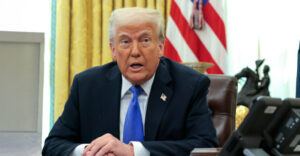There has been a storm of reaction to last night’s announcement by Donald Trump about imposing 25% tariffs on all imported cars, a move that widens the front of the trade war that has opened since his return to the White House.
“What we’re going to do is impose a 25 percent tariff on every car that is not made in the United States,” Trump said from the Oval Office.
The Republican president sees the new tariffs as a means of boosting revenue to offset the tax cuts he has announced. At the same time, it aspires to revive the country’s industrial base, which has shown signs of decline in recent years.
During 2024, the United States imported $220 billion worth of passenger vehicles, as well as $474 billion worth of auto parts and other automotive items. Among the main suppliers are Mexico, Japan, South Korea, South Korea, Canada and Germany, countries expected to take the biggest hit from the new measure.
International reactions
Ursula von der Leyen: “I deeply regret the US decision”
The European Union “deeply regrets” US President Donald Trump’s decision to move to impose 25% tariffs on European vehicles imported by his country, European Commission President Ursula von der Leyen said via X yesterday Ursula von der Leyen.
Japan: “Appropriate retaliatory measures will be taken”
Japan intends to adopt “appropriate measures” in retaliation for the additional customs duties on Japanese vehicles announced by the US government and will consider “all options”, Japanese Prime Minister Sigeru Ishiba warned today. “We must think about appropriate measures after this announcement. Of course, we will consider all options,” Ishiba said, addressing members of the Japanese parliament. The auto industry produces roughly one-third of Japanese-made goods exported to the U.S.
The Japanese government further warned against the “great impact” Trump’s actions would have on the US-Japan trade and economic relationship, as well as on the global economy as a whole.
“We believe that these measures (…) and other more general restrictions on trade imposed by the US government may have a great impact on economic relations between Japan and the US, as well as on the global economy and the multilateral trading system,” Japanese government spokesman Yoshimasa Hayashi told reporters.
The additional 25% customs tariffs on Japanese imported cars announced by Washington are a development “extremely regrettable,” the government spokesman noted shortly before at a briefing for accredited editors. “It is extremely regrettable that the US government announced these tariff measures (…) that include Japan,” he insisted.
Brazil: “We can’t do nothing”
Brazilian President Louis Inácio Lula da Silva said today that his country “can’t do nothing” in the face of the attack launched by US counterpart Donald Trump’s tariffs, extending them yesterday (Wednesday) to the automotive sector.
“We can’t do nothing” as if “they are the only ones who are right and have the ability to tariff other people’s products,” Lula said during a news conference on the sidelines of an official visit to Tokyo. In Brasilia “we will adopt the approach that in our view will be beneficial for Brazil,”
he added.
Canada: Direct attack on our workers
The US president’s decision is a “direct attack” on Canadian workers, Canadian Prime Minister Mark Carney said yesterday Wednesday.
“Customs tariffs against our auto industry are a direct attack on workers” in Canada, the new Liberal leader and prime minister told reporters, accusing Republican President Trump of “betraying” the free trade agreement between the two countries and Mexico.
Shares of Toyota, Nissan, Honda, Hyundai down
Japanese and South Korean automotive giants, from Toyota to Hyundai, are seeing their stock prices in capital markets fall after Asian bourses opened following the announcement of additional customs duties on imported vehicles in the US – a critical market for these manufacturers.
Around 02:10 (GMT) on the Tokyo Stock Exchange, the stocks of big names in the sector were all down without exception: Toyota (-3.72%), Mitsubishi (-3.7%), Nissan (-3.2%), Honda (-2.77%). The general index also showed a downward trend, although not as spectacular (-0.79%). In Seoul, shares of Hyundai Motor (-3.15%) and Kia Corporation (-2%) were on a similar trajectory.
Japan is particularly vulnerable. Last year, the auto industry imported 28% of Japanese goods exported to the US, or somewhere around $40 billion. And the auto industry is a pillar of the Japanese economy, employing 10% of the workforce.
For Japanese giant Toyota, No. 1 globally, ahead of its big rival, Germany’s Volkswagen, the U.S. is an absolutely critical market. Japanese manufacturers, moreover, have a large presence in Mexico as part of the industry’s interconnected production chains. Each year, Japanese manufacturers export somewhere around 1.37 million vehicles to the US, though they are far from their peak of 3.43 million units in 1986, Masanori Katayama, president of JAMA, the Japan Automobile Manufacturers Association, recalled last week. Production “adjustments” would necessarily follow if tariffs were imposed, Mr. Katayama warned.
Toyota recently announced that production will begin in April at its 11th consecutive US plant. However, of the 2.33 million vehicles registered in the US last year, only 1.27 million were produced there.
Toyota also has a plant in Canada (hybrids) and two more in Mexico, with production mainly for the US market, meaning tariff barriers will hit them hard. As if the additional tariffs on products imported from Canada and Mexico – they have been suspended for now – are reimposed, its vehicles imported from those two countries into the US will be subject to a 50% tariff.
Cars account for 27% of South Korean exports to the US. Of the 2.78 million vehicles exported from South Korea last year, about 1.43 million were destined for the U.S. market and valued at some $35 billion. To appease the Trump administration and cushion the impact of the tariffs as much as possible, Hyundai announced on Monday that it plans to invest $21 billion in the U.S. over the next four years.
Ask me anything
Explore related questions





